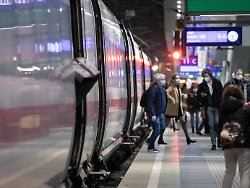Full trains are actually nice for the railway, but undesirable in the Corona crisis. The federal and state governments want to expand seating capacities in long-distance transport. For the railways, this is a feat in financially difficult times.
More space on the trains – but fewer seats that can be reserved: This is what the federal and state government has now decided to take further measures in the Corona crisis. The "seating capacity" of the trains is to be increased significantly in order to allow even more distance between passengers. It is conceivable to use more trains. The ability to reserve seats is to be restricted in parallel. Details should now determine the path.
In a previous draft, specific details were mentioned, such as that from now on only window seats can be reserved. Now one thing is certain: There is no reservation requirement that has been requested on various occasions. The railway and transport minister Andreas Scheuer reject this vehemently. You absolutely want to keep the "open system" with a lot of flexibility. The chairman of the Railway and Transport Union (EVG), Klaus-Dieter Hommel, had also warned against a general reservation requirement: "This would mean that long-distance transport could no longer be handled, that the burden on employees would be much greater than it is today." , he said.
In the resolution that Chancellor Angela Merkel presented in the evening after hours of negotiations with the country chiefs, it now only says: "For rail transport, travelers who have to travel despite restrictions must be offered a reliable offer with the option of keeping a lot of distance . " The resolution envisages increasing capacities by more than 20 million square kilometers per day. The group will do this primarily by using additional trains.
Timetable almost like before the crisis
Meanwhile, the financial situation for Deutsche Bahn is also worsening. As in spring, the load on the trains is falling significantly due to the new wave of corona infections. The railway had adjusted the offer slightly in November and stopped international connections. But by and large, the group kept the timetable upright without major restrictions. The "Frankfurter Allgemeine Zeitung" writes that there is now an annual loss of 5.6 billion euros. This emerges from the documents for the supervisory board meeting on December 9th. Insiders confirmed the figure to the German press agency as a pre-tax loss.
However, it remained unclear whether this included federal financial support or the effects of the renewed partial lockdown. Due to the high losses this year, the federal government, as the owner, wants to add around five billion euros through an equity increase. The money has not yet been paid out. The European Commission has yet to approve the state aid. Above all, the rail freight competitors criticize the support. But the Court of Auditors and the parliamentary groups of the Greens and FDP also see the measure critically.
Matthias Stoffregen, managing director of the Mofair association, in which the rail competition in freight and passenger transport is organized, criticized the decision. In particular, the fact that the federal and state governments are now making specifications for operational business makes him skeptical. The railway decided "as is always emphasized, economically independent," he said. In addition, he assumes that the railway will demand financial compensation to meet the requirements. Similar measures for other transport providers had not been discussed with them.
. (tagsToTranslate) Economy (t) Deutsche Bahn (t) Corona crisis (t) Andreas Scheuer (t) Transport policy
